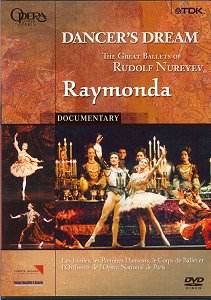First,
since this is primarily a music site: a comment about Glazunov’s
Raymonda score. Alexander Anissimov is the recognised interpreter
of this scintillating work and I thoroughly recommend that readers
acquire his 2CD Naxos (8.553503-04) recording of the complete
Raymonda ballet music with the Moscow Symphony Orchestra.
This ballet music follows in the great tradition of Tchaikovsky’s
Sleeping Beauty and Nutcracker scores with dance
music that is romantic, richly melodic and colourful.
Now
a word of warning: those expecting to see a full production
of Raymonda – or even substantial uninterrupted excerpts
should look elsewhere. The heavy-typed ‘DOCUMENTARY’ shown on
the front cover of this DVD box should be heeded. This DVD presentation
is essentially a homage to the great Nureyev in his appointment
as Artistic Director of Paris Opera in 1983 with the much of the
DVD programme’s time devoted to the Paris Opera’s leading dancers
lining up to relate how Nureyev staged his magnificent new production
of Marius Petipa’s oriental ballet Raymonda. Having said
that balletomanes will be fascinated.
Nureyev
developed a close working relationship with the dancers as choreographer,
teacher and director. Contrary to press reports at the time he
was not paid millions of francs but 35,000 FR per month. Modestly
he looked upon himself "…as more of a doctor, to help the
dancers…’ Many of the dancers testified as to how they had been
encouraged to stretch their technique and talent and how they
had been shown new ways to interpret their roles. They spoke of
his enthusiasm and of how stimulating it was to work with him.
But they also remembered his bad temper, at times, and his demanding
management style: no breaks, only three chances to get a movement
right or you were out etc ...
Nureyev’s
production of Raymonda broke new ground, explored new areas.
He wanted particularly to expand the male roles (19th
century classical ballet was very much feminine-orientated with
the male ballet dancers considered as supporting dancers). Nureyev
made more of the role of the two-dimensional Jean de Brienne who
goes off to the Crusades in Act I leaving Raymonda to languish
until the final act. He also beefed up the dancing of the Saracen
knight, Abderam (who tries to seduce Raymonda) making him a wild
and sensual character. His treatment of the central role of Raymonda
is equally refreshing turning her, by the time of her Act III
triumphal dance, into a woman of strong character. He was also
keen to add colour and narrative interest to the dancers of the
Corps de Ballet.
Interestingly,
Nureyev would coach in great detail the first performers in the
major roles of Raymonda only. He would them to pass on
his teachings to subsequent dancers in their roles with added
refinements and variations but stretching them further. It was
Nureyev’s idea of delegation.
The
interviews are of course interspersed with excerpts from the Paris
Opera’s productions of Raymonda and of the dancers in rehearsal.
A
documentary strictly for balletomanes. Not those
wanting to see the ballet. Recommended – Anissimov’s (this DVD’s
conductor) Naxos recording of Glazunov’s sparkling ballet music.
Ian
Lace

